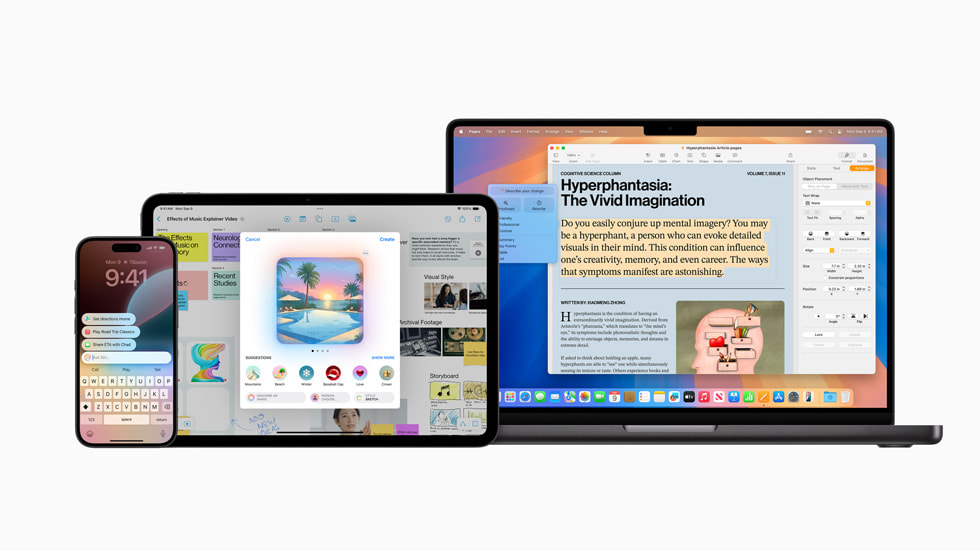In a bold move to safeguard user data, Apple employs bare-bones servers without hard drives, forming a "hermetically sealed privacy bubble," according to Senior VP Craig Federighi. This approach leverages on-device intelligence to minimize external data interaction.
Federighi Discusses Apple’s Privacy Approach
Senior VP of software engineering at Apple, Craig Federighi, has stated that Apple's dedication to customer privacy is maintained through the usage of basic servers in Apple Intelligence products, including Private Cloud Compute.
According to WCCFTECH, the executive implied that this choice was made to avoid any interaction with user information by forming a "hermetically sealed privacy bubble" with the AI servers. This bubble would use the on-device intelligence from Apple and avoid any outside interference.
PCC Servers Boost Privacy by Limiting External Data
As a general rule, Apple's Apple Intelligence features do all processing locally on the device. However, if external processing is required, Apple's servers are contacted. If that fails as well, ChatGPT, with the user's consent, is consulted.
Federighi told Wired that, despite the powerful CPUs used, Apple chooses basic Private Cloud Compute (PCC) servers to increase privacy protection. Since Apple does not utilize hard disks or solid-state drives (SSDs), the company's PCC servers do not adhere to the conventional structure in which storage is a key component.
"PCC servers are as bare-bones as possible. For example, they don’t include 'persistent storage,' meaning that they don’t have a hard drive that can keep processed data long-term."
They take it a step further, according to Craig, by adding additional capabilities to the server to make sure no data remains after the reboot.
"They do incorporate Apple’s dedicated hardware encryption key manager known as the Secure Enclave, and randomize each file system’s encryption key at every boot up as well. This means that once a PCC server is rebooted, no data is retained and, as an additional precaution, the entire system volume is cryptographically unrecoverable. At that point, all the server can do is start fresh with a new encryption key."
Apple Tackles Data Vulnerability with Encryption
The lack of end-to-end encryption was the one area that was neglected and was a weakness for the organization. This left data vulnerable to hackers. As Apple has gradually shifted towards end-to-end encryption, this is also being addressed.
Apple is taking strong measures to guarantee that the system does not infringe on customers' privacy, and they want people to know about it. Even more impressive is their level of openness; anyone may verify it for himself.
"Apple is making every production PCC server build publicly available for inspection so people unaffiliated with Apple can verify that PCC is doing (and not doing) what the company claims, and that everything is implemented correctly."
Data security and system transparency are two of Apple's top priorities, and the company is working tirelessly to achieve both.



 Trump Warns Iran as Gulf Conflict Disrupts Oil Markets and Global Trade
Trump Warns Iran as Gulf Conflict Disrupts Oil Markets and Global Trade  Trump Orders Federal Agencies to Halt Use of Anthropic AI Technology
Trump Orders Federal Agencies to Halt Use of Anthropic AI Technology  Netflix Declines to Raise Bid for Warner Bros. Discovery Amid Competing Paramount Skydance Offer
Netflix Declines to Raise Bid for Warner Bros. Discovery Amid Competing Paramount Skydance Offer  Snowflake Forecasts Strong Fiscal 2027 Revenue Growth as Enterprise AI Demand Surges
Snowflake Forecasts Strong Fiscal 2027 Revenue Growth as Enterprise AI Demand Surges  DeepSeek AI Model Trained on Nvidia Blackwell Chip Sparks U.S. Export Control Concerns
DeepSeek AI Model Trained on Nvidia Blackwell Chip Sparks U.S. Export Control Concerns  OpenAI Hires Former Meta and Apple AI Leader Ruomin Pang Amid Intensifying AI Talent War
OpenAI Hires Former Meta and Apple AI Leader Ruomin Pang Amid Intensifying AI Talent War  Microsoft Gaming Leadership Overhaul: Phil Spencer Retires, Asha Sharma Named New Xbox CEO
Microsoft Gaming Leadership Overhaul: Phil Spencer Retires, Asha Sharma Named New Xbox CEO  Coupang Reports Q4 Loss After Data Breach, Revenue Misses Estimates
Coupang Reports Q4 Loss After Data Breach, Revenue Misses Estimates  Pentagon Weighs Supply Chain Risk Designation for Anthropic Over Claude AI Use
Pentagon Weighs Supply Chain Risk Designation for Anthropic Over Claude AI Use  Nvidia Earnings Preview: AI Chip Demand, Data Center Growth and Blackwell Shipments in Focus
Nvidia Earnings Preview: AI Chip Demand, Data Center Growth and Blackwell Shipments in Focus  Samsung and SK Hynix Shares Hit Record Highs as Nvidia Earnings Boost AI Chip Demand
Samsung and SK Hynix Shares Hit Record Highs as Nvidia Earnings Boost AI Chip Demand  Anthropic Refuses Pentagon Request to Remove AI Safeguards Amid Defense Contract Dispute
Anthropic Refuses Pentagon Request to Remove AI Safeguards Amid Defense Contract Dispute  Boeing Secures $166.8 Million U.S. Navy Contract for P-8A Engineering and Software Support
Boeing Secures $166.8 Million U.S. Navy Contract for P-8A Engineering and Software Support  Federal Judge Blocks Virginia Social Media Age Verification Law Over First Amendment Concerns
Federal Judge Blocks Virginia Social Media Age Verification Law Over First Amendment Concerns  Hyundai Motor Group to Invest $6.26 Billion in AI Data Center, Robotics and Renewable Energy Projects in South Korea
Hyundai Motor Group to Invest $6.26 Billion in AI Data Center, Robotics and Renewable Energy Projects in South Korea  Synopsys Q2 Revenue Forecast Misses Expectations Amid China Export Curbs and AI Shift
Synopsys Q2 Revenue Forecast Misses Expectations Amid China Export Curbs and AI Shift  Meta Signs Multi-Billion Dollar AI Chip Deal With Google to Power Next-Gen AI Models
Meta Signs Multi-Billion Dollar AI Chip Deal With Google to Power Next-Gen AI Models 































